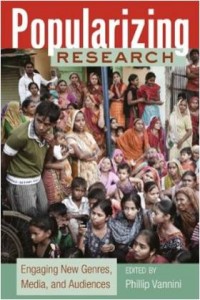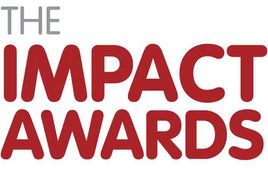Peter Lang Publishing announces the publication of Popularizing Research: Engaging New Genres, Media, and Audiences, edited by Phillip Vannini of Canada’s Royal Roads University.
 The book’s opening Chapter, “Short Film as Performative Social Science: The Story Behind “’Princess Margaret’” was written by Dr Kip Jones, Reader in Qualitative Research and Performative Social Science, who shares a joint appointment in HSC and the Media School. The Chapter outlines his fascinating and innovative approach to research and its dissemination via a fusion of the arts and social sciences.
The book’s opening Chapter, “Short Film as Performative Social Science: The Story Behind “’Princess Margaret’” was written by Dr Kip Jones, Reader in Qualitative Research and Performative Social Science, who shares a joint appointment in HSC and the Media School. The Chapter outlines his fascinating and innovative approach to research and its dissemination via a fusion of the arts and social sciences.
Jones utilizes his chapter to recount an unconventional journey to academic publishing that certainly did not follow the usual route of journal or book publication. The Chapter revisits “The one about Princess Margaret”, one of Jones’ earliest attempts at audio/visual script writing, by recalling his initial motivation and enthusiasm for finding innovative ways to express scholarship and how his thinking about the use of tools from the arts in social science has evolved since those early days. These personal experiences are then offered up as advice in a summation for both social scientists and arts practitioners who may be interested in this new paradigm of Performative Social Science through a discussion about collaboration and pathways to impact.
Popularizing Research offers academics, professional researchers, and students a new methodological book/website hybrid by way of a broad survey of ways to popularize research. As an edited interdisciplinary book accompanied by a website featuring samples of popularized research, it will have the potential of not only telling its readers about new genres, new media, new strategies, and new imperatives for popularizing research, but most importantly it will also be useful in showing how these new processes work in the end, what they sound like, and what they look like.
For more information and to view the video representing Jones’ contribution to the book, see his page on the book’s website under ‘Film’.








 The
The 




 Calling all Supervisors and Staff – this is your opportunity to comment on BU’s ethics review process!
Calling all Supervisors and Staff – this is your opportunity to comment on BU’s ethics review process!










 REF Code of Practice consultation is open!
REF Code of Practice consultation is open! BU Leads AI-Driven Work Package in EU Horizon SUSHEAS Project
BU Leads AI-Driven Work Package in EU Horizon SUSHEAS Project Evidence Synthesis Centre open at Kathmandu University
Evidence Synthesis Centre open at Kathmandu University Expand Your Impact: Collaboration and Networking Workshops for Researchers
Expand Your Impact: Collaboration and Networking Workshops for Researchers ECR Funding Open Call: Research Culture & Community Grant – Apply now
ECR Funding Open Call: Research Culture & Community Grant – Apply now ECR Funding Open Call: Research Culture & Community Grant – Application Deadline Friday 12 December
ECR Funding Open Call: Research Culture & Community Grant – Application Deadline Friday 12 December MSCA Postdoctoral Fellowships 2025 Call
MSCA Postdoctoral Fellowships 2025 Call ERC Advanced Grant 2025 Webinar
ERC Advanced Grant 2025 Webinar Update on UKRO services
Update on UKRO services European research project exploring use of ‘virtual twins’ to better manage metabolic associated fatty liver disease
European research project exploring use of ‘virtual twins’ to better manage metabolic associated fatty liver disease